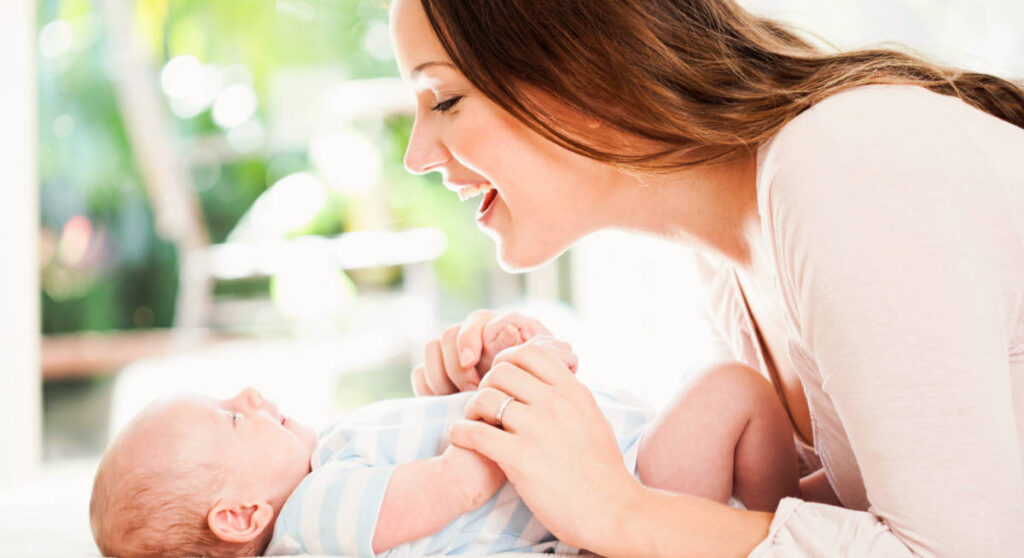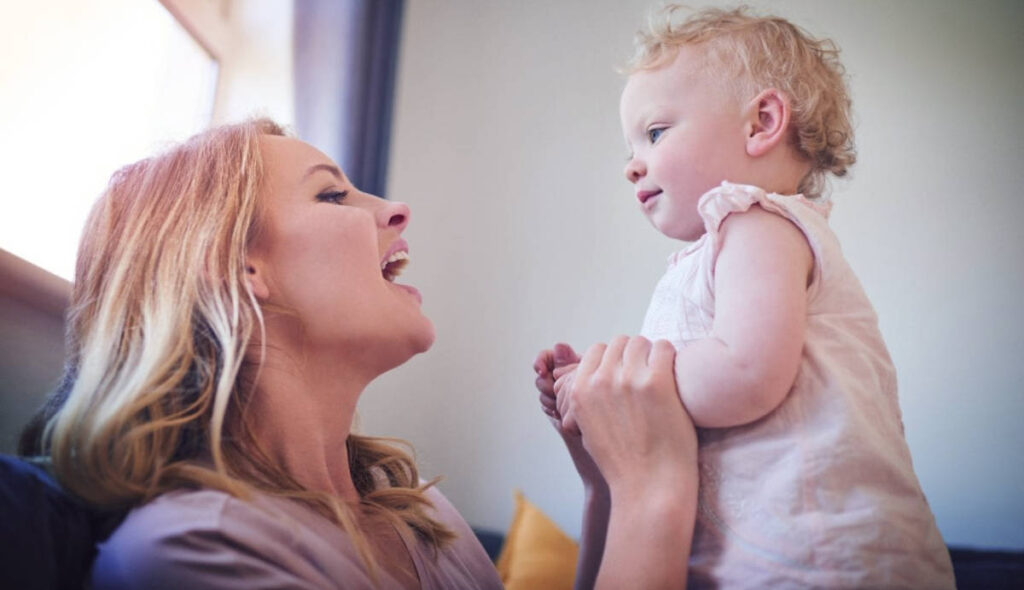When do babies start talking? Unlock the mystery of your baby’s first words with us! Babies open up a new world for parents when they start to talk. While it can be hard to know precisely when and what those little voices will say, we have all you need to get started on this exciting journey. From tips and tricks that help guide babies in their language development, join us as explore the timeline of one-of-a-kind milestones culminating in an unforgettable ‘first word.’

Get set to find out the secrets behind teaching your baby how to talk! We’ll look at key tips and tricks for helping them develop language skills – a fantastic start in life. When do babies begin speaking? Join us as we uncover the answers…
The importance of language development in babies
As a baby matures and grows, communication is essential for development. When do babies start talking? Unlock the mystery of your baby’s first words with us! Babies open up a new world for parents when they start to talk. Babies are not born knowing how to express themselves – they need time with their parents or caregivers in order to learn language skills that can later be used for expressing needs, desires, and feelings. By doing so, babies will gain the confidence to develop essential life-long social capabilities.
The Pre-Talking Stage
Babies are beginning their journey into the world of communication! During this pre-talking stage, they may already be absorbing vocal cues and learning how to interact. For example, babies may begin attempting simple sounds such as babbling or squeals; respond with facial expressions like smiling when spoken to; recognize names & objects from pictures shown by others; and observe changes in people’s faces before responding appropriately.
What happens during the pre-talking stage of Babies
During the pre-talking stage, babies build an important foundation for communication and relationships. They learn how to vocalize sounds, as well as develop a basic understanding of language that sets them up to interact with others – laying down a crucial cornerstone of socialization!
What parents can do to help their baby learn to talk
As a parent, you can help your baby develop communication skills and become an expert talker! Modeling correct pronunciation of words is key – think mirror imitation. Also, create opportunities for them to practice by talking with them or reading aloud books together in order to get those little vocal cords working.
The Babbling Stage
Toddlers may not be able to string together full sentences yet, but they have their own way of expressing themselves. When do babies start talking? The Babbling Stage is the first step in language development for babies and occurs between 12-20 weeks old: when little ones start making vocalizations like “ma,””da,” or fancier syllables such as baba and gaga! Through these babbles, infants are learning how to shape sounds that will eventually become words—while also discovering ways to communicate with those around them.
How babbling develops into first words
As babies develop, they go from uttering meaningless syllables to forming sentences! Babbling is an important step in the process; research suggests that it may lay a foundation for a speech by helping infants learn how to make sounds. When do babies start talking? From about 6 months of age, babbles become more cogent and eventually evolve into actual words as toddlers reach 18 months old.
How parents can help their baby progress to the next stage
Parents have a key role in helping their babies make strides when it comes to language development. Nurturing communication and providing opportunities for practice are essential steps that can empower babes to move forward with talking milestones.
The Babies First Words Stage
The Babies First Words Stage is an exciting and unforgettable moment for parents. As your baby grows, their babbling may become more articulate – they could soon be saying “da,” “ma” or even “pa”! It’s a magical time to witness them begin to use language as well as further develop those all-important verbal skills; something you’ll both cherish forever!
What are the first words?
It’s a magical moment when your little one utters those first few words: “Mommy” and “Daddy”. A sure sign that their understanding of the world is growing, it heralds this new stage of development.
How parents can encourage their baby to use language
As babies’ little minds begin to explore the world of language, parents can play a crucial role in guiding them. When do babies start talking? By providing chances for communication, applauding their efforts and offering verbal & nonverbal support – like reading stories or singing rhymes with them – you’ll not only help your baby learn but also create wonderful memories!
when do babies Start Talking?
As a child reaches their milestone 18th month, many parents can expect to hear the first few words uttered by little ones. However, some children may take a bit longer before they start talking – up until two or three years old!
When to Seek Professional Help
If you want to ensure your baby is on the right track with their language development, then it may be worth consulting a professional. However, there are also many simple steps and activities that can help encourage linguistic growth in young children. These include talking often; making eye contact during conversation time; introducing books for reading out loud together; repeating words back during dialogue conversations or commenting on everyday events such as going grocery shopping – all of which will give babies an opportunity to learn new sounds and expand their vocabulary!
Signs that your baby is having difficulty with language development
Is your baby under one year old and has yet to say their first word? If so, this may be a sign of delayed language development. To better understand the severity of such an issue, check for signs like not being able to utter their name or comprehend simple instructions correctly when spoken aloud. In addition, watch out if they are struggling with using words in context as well as basic grammar rules—as these could all point towards potential difficulties in forming coherent speech.
Look out for early signs that could indicate a problem with your baby’s language development; if spotted, it is best to consult with a specialist as soon as possible. Early intervention can be crucial in helping ensure positive communication outcomes!
What to expect from a speech therapist
A speech therapist is a specialist that helps people with communication difficulties to overcome their challenges. Through personalized care and treatment, they aim to develop the patient’s pronunciation, articulation, fluency and overall communication skills in order to enhance problem-solving abilities and enrich self-confidence levels.
Conclusion
Every baby is an individual and will develop speech in their own time. While some babies may surprise you by babbling at around six months, others could take until 18 months or later to start saying real words. Communication between parents and babes can help jumpstart the language-learning process – so be sure to chat away! Positive reinforcement also plays a part: don’t forget those smiles of encouragement when your little one shares new sounds with you!
Uncovering your little one’s first words can be a wonderful journey of discovery for both parents and their children. As you explore this area, take the time to look out for red flags that may signal language delays – like not reacting when hearing their own name or failing to produce single clear words by 18 months old. To help guide you through it all, check our blog section where we provide many valuable tips and recommendations! Be sure to share our content with your loved ones so they too have access to helpful advice concerning baby milestones.
Reading suggestions:



